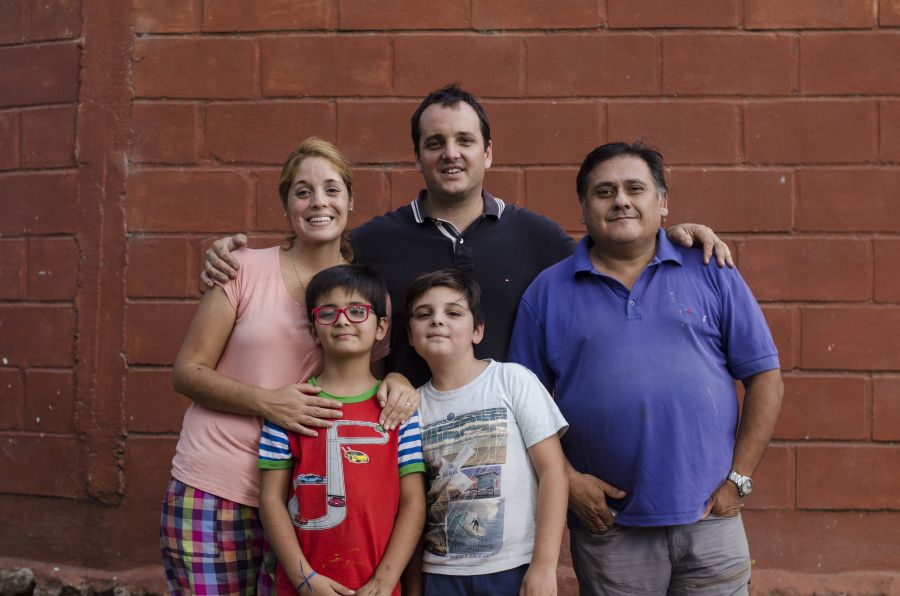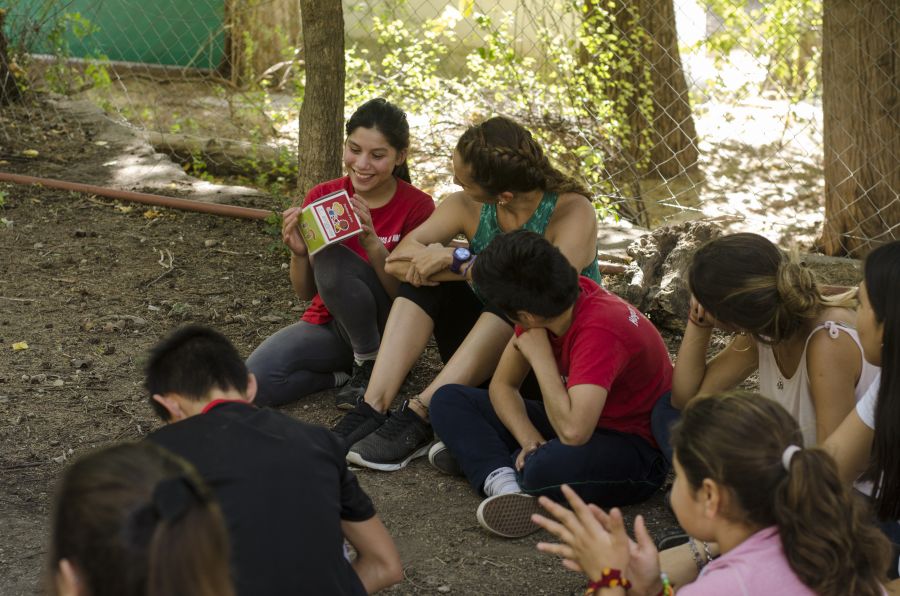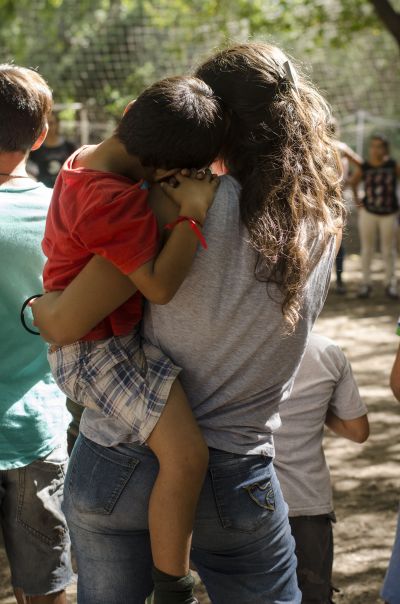
Workshop
Making peace in children natural

The story of Victoria Romero and Esteban Bongiovanni who, together with their two children, decided to leave everything and go to live in San Marcos Sierras, in the Province of Cordoba, Argentina, to run a home for children involved in court cases.
Victoria, Esteban, and their two sons, Francisco (10) and Enzo (8), are from La Falda, a little town with a clear tourist vocation in the Province of Cordoba, Argentina. This is where they lived, worked, and went to school, like every family. However, 4 years ago, they made a drastic change in their lives, in response to a call from God. In 2014, they moved to San Marcos Sierras, a town a little further north, to run the Hogar Sierra Dorada (Sierra Dorada home for children), where they take care of dozens of children and teens involved in court cases who live there until 18 years old, when they are adopted or returned to their family of origin.
We are sitting at a table in the outdoor dining room, while Victoria and Esteban tell us: “We had a very bad image of homes for children, like those you can watch in movies, where children are beaten or ill-treated. Here everything is very different, it’s like a big family. We strive to improve their situation and help them to get rid of the ghosts of violence and awful conditions in which they used to live, to make them understand that the ‘normal’ thing at their age is to live in peace, to play, and to study.”
The children who come here are taken away from their families of origin because they lived there in conditions of violence, ill-treatment, rape, and/or abandonment. At that stage there were 28 children and teens living there, from the very young up to 17 years old.
“Our work starts with receiving them; most of them come here with an experience of abuse, physical violence, underfeeding, etc. behind them. Since their arrival, it is all about containing them, giving them love, and accompanying them, because we are like mum and dad for them. We have a technical office with psychologists who take care of them, but those who live here just go on day by day. We try to inculcate them with the idea of putting their lives in order, and to help at home. We start by giving them a toothbrush and teach them to brush their teeth, to wash up every day, to put on clean clothes, and we educate them to be responsible for their homework and at school.” They proudly explain that each of them has their clothes, their personal items, “just as in every family.”
With a big smile, Victoria shares to us one of the many stories they lived together:”A few weeks ago we went to a hotel with all the kids, because they had invited us for the weekend. I did not make up my bed, because I thought: I’m in a hotel. Then I realized – and it was shocking – that the kids had left all the rooms tidy, with impeccable bathrooms and their bed made up. So I went back to my room, with tears in my eyes, to make up my bed, because I realized I did not do it, but above all because I had seen a fruit of our work, and that it is worth it, because they carry it with them wherever they go.”
Leaving everything and starting afresh
“We always say that a year before getting to know the Hogar, we were aware of our very disordered life, as a family, from the economic point of view, etc. In addition, I used to work at night, Victoria was alone with our children and there were always complications, many problems of respiratory health, etc. We had asked God for a change of life,” Esteban tells us.
They came to know about this place through the Church. Julio, the Hogar’s founder, offered them to go and work there, and in a short time, after settling some things at La Falda, they went to live in the Hogar.
“At the beginning it was a continuous challenge, an adventure, but little by little we adapted and it was amazing how things worked out. The kids did not get sick anymore, we could have a family life, we even managed to go on vacation,” they say with satisfaction.
The answer to a call
“We lived all this as a service vocation we were called in. However, as we always say, you do not have to behave like a crazy person who leaves everything and goes to live in a children’s home. You can do all this with the people who are next to you, wherever you are. Starting with the little things, such as giving your seat to an elderly person on the bus, making up your bed in the morning, behaving like polite people, driving the car safely and without any aggressive attitude, etc. And from there, spreading good deeds.”
“We understood that God will never lay us down if we do things well, as we are supposed to do, without expecting anything in return, with humility and confidence. And the fact is that it works and this confirms that we are doing well,” concludes Esteban.

A work of many
Since the times of the Foundation, in the Hogar, they are constantly trying to improve the place, by painting the walls, or adding new games… They even managed to get as a gift a swimming pool for the summer, which is always very hot. For this, they know that the best thing is to join forces with various organizations and institutions that strive to take positive action. Hence, they collect funds, clothes, and food, so that the kids can always live in better conditions. They constantly launch campaigns to carry out activities with the kids, such as “Traveling will heal you,” whose target is to raise funds to enable them to know the sea and enjoy it. They collect educational materials for school and carry out a host of other activities.
They witness the fact that “people show great solidarity, and even more so when they know the reality of the place and build a relationship with the kids. There are young foreigners who undertake internships of social work, including some university students from Argentina. Many participate in the activities of the Hogar, even from outside. We are aware that without the good management of Julio and Patricia Laciar, its founders, and all the people who help us, this business would have closed a long time ago,” conclude Victoria and Esteban.
The Sierra Dorada Foundation
This reality came about 18 years ago, when its “founding uncle and aunt,” Julio and Patricia Laciar, started the Hogar in San Marcos, in the house where they lived. They began by cooking with a big pot and firewood and washing the kids in the irrigation canal, because they had nothing, except the generosity of wanting to change the reality of those kids who came from very hard experiences. Little by little, thanks to their good management and the great love and solidarity of many people, this experience grew also in organization and became what it is today: a property with apartments, bathrooms, kitchen, soccer field, playground, and a swimming pool, all surrounded by nature in the hills of Cordoba.
Moreover, today they do not manage only a house, but a Fundación (Foundation) which includes four workshop-houses (San Marcos Sierras, Embalse de Rio Terzero, Rumipal, and Salsipuedes), several family programs, reception centers, and scholarships for volunteers, among other numerous activities.
“Our concern should not only be addressed to people who do bad things, but also to good people who do nothing for their fellow men and women,” said Julio and Patricia quoting Martin Luther King. And they add, “Since we started up we have been focusing on promoting actions of good will and make more people join this approach.”




